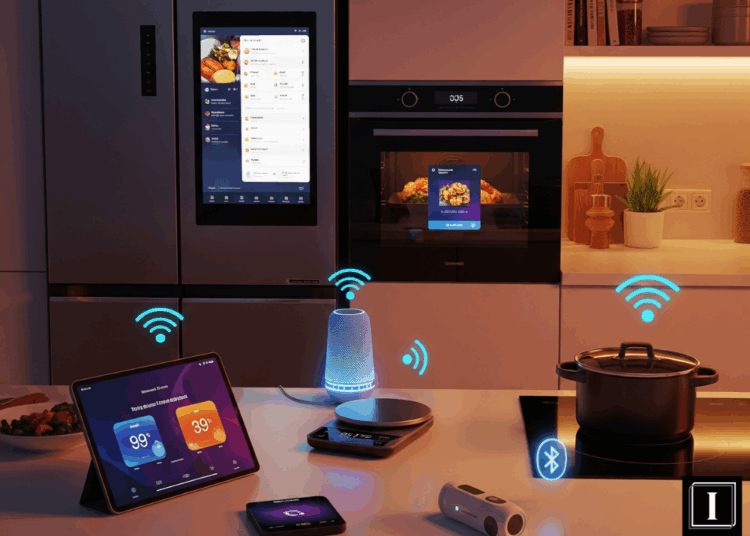The rise of IoT in kitchens marks a significant transformation in how we prepare, cook, and manage food. From smart ovens that adjust temperatures on their own to refrigerators that track expiration dates, smart kitchen technology is creating unprecedented convenience and efficiency in modern households. As we move towards a fully connected home, the kitchen—often considered the heart of the home—is becoming a hub of intelligent innovation.
The Role of IoT in Kitchens
The IoT in kitchens involves the use of connected devices and appliances that communicate with each other and the user through the Internet. These devices leverage sensors, AI, and cloud computing to streamline tasks and improve decision-making. Connected kitchen devices are designed to reduce manual efforts while enhancing the quality and precision of cooking.
Imagine being able to preheat your oven remotely, get alerts when your roast is done, or receive meal suggestions based on what’s in your smart fridge. These are not futuristic fantasies—they’re realities thanks to IoT kitchen appliances.
Smart Kitchen Technology Enhancing Daily Life
Smart kitchen technology empowers users to manage their cooking routines efficiently. Whether it’s a coffee machine that starts brewing as you wake up or a dishwasher that operates during off-peak hours to save energy, IoT-enabled appliances offer both time-saving and eco-friendly advantages.
Voice control and mobile apps have added another layer of convenience. With a simple voice command, you can instruct your oven to start cooking, or have your smart speaker guide you through a recipe. This hands-free control is especially helpful in busy households and for those with mobility challenges.
Connected Kitchen Devices and Automation
Connected kitchen devices work together to automate and optimize the cooking experience. For example, a smart refrigerator can communicate with your grocery app to add missing items to your shopping list. Kitchen automation goes beyond just turning devices on or off—it includes intelligent decision-making based on real-time data.
For example, if your refrigerator detects that your milk is about to expire, it can notify you or even suggest recipes to use it up. Similarly, a smart scale can help you measure ingredients precisely and send data directly to your cooking app, adjusting the recipe on the fly.
IoT Kitchen Appliances: A New Standard
The adoption of IoT kitchen appliances is becoming increasingly common. These include smart ovens that self-clean, microwaves that scan barcodes for optimal cooking instructions, and even Bluetooth-enabled meat thermometers that send alerts to your phone when your steak reaches the perfect temperature.
This kind of kitchen automation allows even novice cooks to achieve consistent and professional results. Plus, many of these devices are energy-efficient, contributing to a more sustainable kitchen.
Internet of Things in Cooking: Beyond Convenience
The Internet of Things in cooking is not just about convenience—it’s about creating a holistic, intelligent cooking environment. These technologies reduce food waste, improve safety, and encourage healthier eating habits. For instance, some smart fridges can track nutritional content and suggest balanced meal plans based on what’s inside.
From a safety perspective, smart stovetops can automatically shut off if left unattended, and sensors can detect gas leaks or smoke before they become dangerous. This makes the kitchen not only smarter but also safer for everyone in the household.
Food Tech Innovations Changing the Culinary Game
Food tech innovations powered by IoT are pushing the boundaries of what’s possible in home cooking. Companies are developing robots that can assist in food prep, AI systems that perfect recipes over time, and smart bins that track food disposal to help reduce waste.
The combination of AI and smart cooking solutions ensures that kitchens are not only more efficient but also more personalized. Your devices can learn your preferences—how crispy you like your toast or how strong you like your coffee—and adjust accordingly.
Smart Cooking Solutions for the Modern Home
Smart cooking solutions are tailored to fit every lifestyle, from the busy professional to the health-conscious family. Whether it’s syncing your cooking schedule with your calendar or getting alerts when you’re low on pantry staples, IoT is making kitchens more intelligent and responsive.
And as more devices become compatible with common smart home platforms, users can enjoy seamless integration with lighting, HVAC, and entertainment systems. Your kitchen can now adjust lighting for mood-based cooking or play your favorite podcast while you prep dinner.
The Future of IoT in Kitchens
The future of IoT in kitchens lies in even greater personalization, sustainability, and interconnectivity. With AI-driven analytics and machine learning, our kitchens will continue to evolve into proactive, learning environments that cater to individual needs while promoting efficiency and well-being.
Expect to see more voice-interactive recipes, augmented reality cooking guides, and integrations with health monitoring systems. As food tech innovations mature, our kitchens will not only feed us—but understand us.
Conclusion: A Connected Culinary Future
The integration of IoT in kitchens is not just a technological trend—it’s a culinary revolution. From enhanced safety and energy efficiency to personalized recipes and automation, smart kitchen technology is transforming the very nature of food preparation.
If you’re looking to understand how this revolution impacts the world of innovation and sustainability, explore more with IMPAAKT, featured in every top business magazine.











